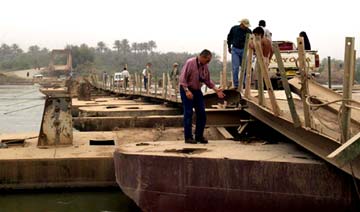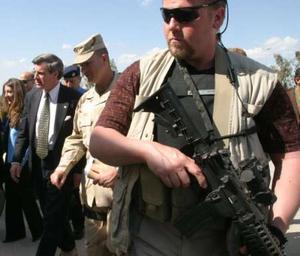NONPARTISAN.
EMPOWERING.
|
Last updated on: 6/11/2008 12:07:00 PM PST
What is the role of private security companies in Iraq?General Reference (not clearly pro or con)
 A contractor from Bechtel Construction, assesses a bridge in Al Aziziyah, Iraq in 2003 to decide what repairs need to be made.  A bodyguard from Blackwater USA (right) protects former Coalition Provisional Authority head Paul Bremer (left) in Iraq in 2004.
Gregory B. Starr, MA, Deputy Assistant Secretary for Countermeasures at the Bureau of Diplomatic Security, stated in a June 13, 2006 statement before the House Government Reform Subcommittee on National Security, Emerging Threats, and International Relations: "The Department of State
primarily utilizes private security firms in Iraq for two major
functions. The first is static guard services at our facilities. These
contract security operations are similar to local guard contract
programs we utilize at our embassies, consulates, and residences around
the world. The second contracted functions that private companies provide are personal security details and security escorts... These contractors operate in a very dangerous environment, and their actions, equipment, and methods of operations are specified in our contract requirements. Rules of engagement developed by the embassy and approved by the Chief of Mission and Diplomatic Security govern their use of deadly force...
The services we provide
are primarily for the protection of U.S. Government employees and
staff. We do not provide security services for private companies,
non-governmental organizations, or implementation partners. However, we
are willing to share our contract requirements with those organizations
supporting our effort through the Overseas Security Advisory Council,
or OSAC, domestically and in Iraq. In closing, I would like to say that our ability to provide protective operations on the scale required in this high-threat environment would not have been possible without using private security providers. The number of personal security specialists we utilize in Iraq alone is more than all the Diplomatic Security agents we have globally. We could not have hired and trained new agents to meet this requirement as rapidly as the contractors met the requirement, even if we had the funding and FTE [Full-Time Equivalents] available. Meeting this relatively short duration requirement using competitively bid contractors along with establishing high standard requirements is the best possible solution for these circumstances." June 13, 2006 - Gregory B. Starr, MA
The US Government Accountability Office (GAO) stated in its July 2005 report "Rebuilding Iraq: Actions Needed to Improve Use of Private Security Providers": "The use of private security providers
reflects the uncertain security environment that was, and is still being
encountered in Iraq, as well as the fact that providing security for agencies
and contractors is not part of the U.S. military’s stated mission. U.S.
military forces in Iraq provide security only for those DOD civilians and
contractors who directly support the military’s mission. In Iraq, as elsewhere, the U.S. Ambassador, as Chief of Mission, has overall responsibility for the security of U.S. government executive branch employees, except for those under the force protection of the combatant commander. However, individual U.S. government agencies have had to arrange for their own security services. As neither DOD nor the Department of State is responsible for providing security to reconstruction contractors, the terms of their contracts require reconstruction contractors to provide for their own security; and, they typically have done so by awarding subcontracts to private security providers... The providers may be U.S. or foreign companies and their staffs are likely to be drawn from various countries, including the United States, the United Kingdom, South Africa, Nepal, Sri Lanka, or Fiji, and may include Kurds and Arabs from Iraq. Generally, private security providers provide the following services:
July 2005 - Rebuilding Iraq: Actions Needed to Improve Use of Private Security Providers (2005) (1.02 MB) Government Accountability Office (GAO)
Doug Brooks, MA, President of the International Peace Operations Association (IPOA), an association of private contractors, stated in a Mar. 22, 2005 interview on the PBS show Frontline: Private Warriors: "Q:
But the role [of private military contractors and private security
contractors] in the Iraq war is proportionately greater [than in other
conflicts]? Brooks: Yeah, it's probably a little bit more. Q: So why is that? Brooks: Well, for a number of reasons. We're doing a lot more of the reconstruction, so a lot of the companies are both supporting the military and supporting the reconstruction. The military is about a third smaller now than it was at the end of the Cold War, and yet I would argue it's much more effective. ... What they've done is they've focused a lot of their efforts into, as we say, the tooth. If you think about tooth-to-tail ratio, the tooth being the combat arms and the tail being the support units, and the military is focused really on the tooth side, so it's become incredibly capable as a military... Q: And all of this, of course, requires -- the larger the tail, the more protection the tail needs along the way. You have to protect the convoys. Brooks: Right. And that would apply whether it's military or civilians that are doing the logistics. Even military logistics need security. So that's always a plight. Q: So you've had a big expansion in the role of private security and private military contractors. Brooks: Right. Now, I think you have to keep in mind that the security companies, their size goes up and down as their contracts go up and down. So we have what has been called ... the Baghdad bubble. Essentially, you have a time when there's a lot of need for security for both the reconstruction effort, for the convoys, to protect a lot of things going on, and the politicians. And how do you create a democracy when all the politicians are being killed off by insurgents? You've got to protect them. So there's a big role for security right now. Now, as the security situation improves and as the Iraqi military comes online and the police, you'll see less need for the private sector." Mar. 22, 2005 - Doug Brooks, MA |